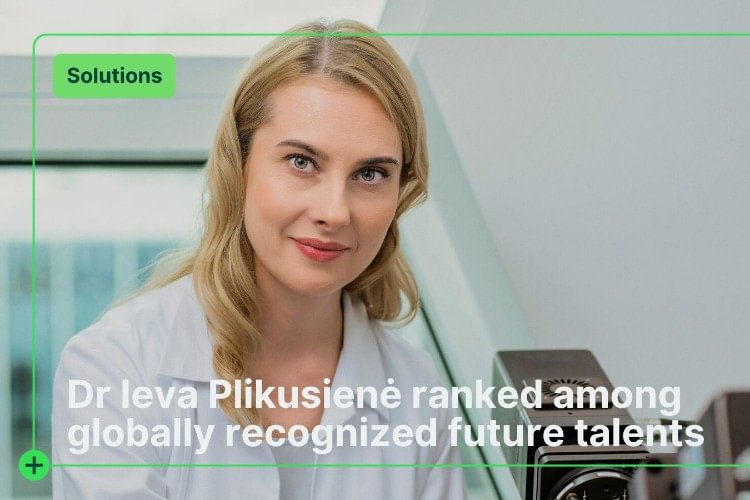Dr Ieva Plikusienė ranked among globally recognized future talents
The list of the world's most promising female scientists includes Lithuanian Associate Professor Dr Ieva Plikusienė. She was recognized for her research on SARS-CoV-2 protein-antibody interactions and is among the winners of the international Rising Talents awards. These awards are a part of the annual L'Oréal-UNESCO Women in Science programme, which recognizes the contribution of women scientists.
The award is given annually to fifteen promising women scientists from different countries who are making significant contributions to the advancement of science in a wide range of fields, and who have the potential to make a difference in the world through their scientific research.
The week of events dedicated to this occasion will begin on 20 June. The winners will take part in a leadership training programme as part of the awards. The International Rising Talents Awards ceremony will take place at UNESCO Headquarters in Paris on 22 June.
"I am very happy to have represented Lithuania in this global competition and to have been selected as one of the winners. Scientists from all over the world are participating in the competition, the programme is carried out in 110 countries, so the competition is very tough. I think this is a great opportunity to show that innovative research of the highest level is being carried out here in Lithuania and that it is being recognised on a global scale. It is a great honour, an important recognition and encouragement not only for me personally, but also for the whole research team with whom we are conducting our research together", says Plikusienė, Associate Professor at the Centre for Nanotechnology and Materials Science "Nanotechnas", Faculty of Chemistry and Geosciences, Vilnius University.
The prestigious award was given for her research on SARS-CoV-2 protein and specific antibody interactions using next-generation optical-acoustic sensors. These sensors and mathematical models provide valuable information on antibody and antigen interactions, real-time formation and stability of the protein-antibody complex, and the spatial distribution of proteins. This can be used not only for the development of immune sensors in the laboratory, but also for the selection of the most suitable antibodies and antigens for rapid tests, and for the selection of the most suitable proteins and antibodies for drugs or vaccines against COVID-19.
In addition, such sensors can be used to detect and analyse other biologically active substances, such as cancer markers and others.
This is the second time that the International Rising Talents Award has been given to a Lithuanian scientist. In 2019, it was awarded to neuroscientist Dr Urtė Neniškytė, a researcher at the Department of Neurobiology and Biophysics, Vilnius University Life Sciences Centre.
The week of awards events starting on 20 June will be dedicated to bringing together the world's top female scientists in Paris. A variety of events, including an extraordinary lecture at the Academy of Sciences and networking events, will promote interaction between these eminent women scientists until 23 June, The UNESCO Awards Ceremony. The special award ceremonies will take place over two days and will feature the winners of the last three years. 15 outstanding female scientists will receive the L'Oréal-UNESCO For Women in Science International Awards for their outstanding scientific achievements in recent years, while 30 young female scientists selected in 2020 and 2022 will be honored as International Rising Talents.
The international L'Oréal-UNESCO Women in Science programme aims to honor and accompany women researchers at key moments in their lives, making a significant contribution to the development of science and gender equality in the field. In the 24 years of the programme's existence, more than 3.9 thousand young women have already received support to achieve their major career goals. At regional level, L'Oréal-UNESCO awards scholarships to scientists in 110 countries, including all three Baltic States.

